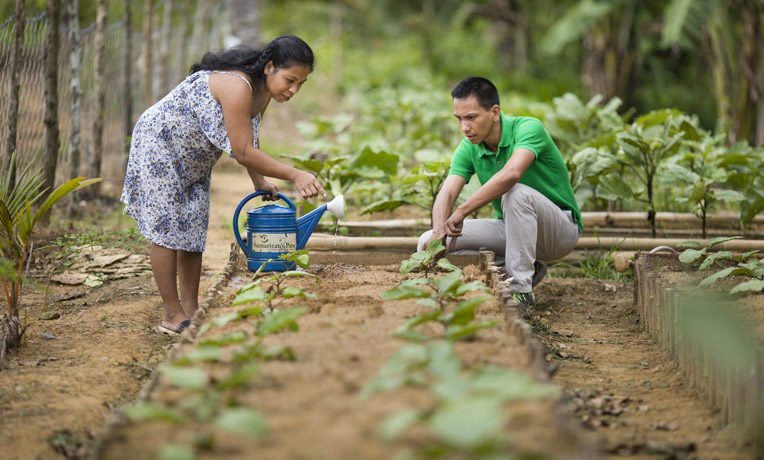To discover benefits of social entrepreneurship activities in rural areas and understand the rural environment that constitutes both challenges and opportunities for entrepreneurs, Artur Steiner and Simon Teasdale have conceptualized the operation of rural social enterprises, outlining their dependence on three main domains:
- geographic (or rural) domain – constitute both challenge and opportunities, as rural areas are characterized by a high level of entrepreneurialism, co-operation, civic participation and dense social networks,
- social enterprise domain – offers an integrated approach to tackling interconnected problems of rural communities through drawing on the local resources,
- policy domain – constitute the legal framework and support for the operation.
Rural and policy domains are perceived as external environments structurally influencing social entrepreneurship, which still functions without the intervention of social business. Conversely, the social enterprise domain represents the agency of individual entrepreneur, which is able to choose clients and beneficiaries, select legal forms and governance structures, address the balance between commercial and social goals, etc. These three domains were used to explore social entrepreneurship impact in rural areas of Scotland by conducting a series of interviews with local stakeholders.
Impacts of social enterprises on rural development
Job creation is considered as particularly important for rural areas where employment opportunities are limited, dependence on public sector jobs is high and where business opportunities are perceived as scattered. Rural social enterprise brings significant investments and maintain money in the local areas by selling local products and generating employment. Moreover, often social enterprises fulfil very specific needs in communities by providing local services that otherwise would not be delivered, for instance, by highly commercial or public bodies. Social entrepreneurs have the power to both draw upon and stimulate voluntary and collaborative community culture, thus binding communities together. The reason hides in both management conducted by the local people (incl. volunteers) and the purpose of the operation – for local people’s welfare. Consequently, common purpose becomes a key motivation for joined action and local integration.
In a rural context, small interventions make a large impact, therefore operations of social enterprises, that cover both economic needs and public service gaps and involve a variety of actors, are more integrated in reaching social impact goals.
Opportunities for rural social enterprises – they do exist!
Procurement policy reforms are seen as an opportunity for social entrepreneurship development in distant areas, as in a lot of cases social enterprises are seen as more efficient in service delivery than public service providers are (i.e. regarding healthcare, social care services). Social enterprises bring more innovation and more customer-oriented solution in contrast, therefore social contacts are seen as a way to increase employability in rural areas and decrease the pressure on public spending simultaneously. Also, local social enterprises are more aware of the exact needs and problems of local rural society member, therefore are willing to deliver more customized services and use local resources (i.e. human resources, community settings etc.) creatively and purposefully. This in turn requires collaborative work across sectors, incl. cooperation and experience sharing.
Challenges for rural social enterprises are more than real
Low population density, isolated communities, lack of larger town centres, long distances to travel, a lack of efficient public transport and well-developed infrastructure are the main barriers for social entrepreneurship development in rural areas. These hinder generation of income and self-sustainment, and business development is more time-requiring in rural settings.
Support for social entrepreneurs – benefit or risk?
The nature of social enterprise itself is competing, as balancing between social and commercial objectives is a struggle. Many agree, that it is difficult for social enterprise to survive without having additional grant support, however often it constitutes too big dependency and neglect of commercial aspect while running socially-oriented entity. Generally speaking, special loans, grants, startup awards and other support mechanisms are perceived well if distributed purposefully and do not convert businesses into grant-dependent social structures.
On the other hand, even if policy support for social enterprises nationally is well-designed (for instance, as it is recognized in Scotland), it is often poorly translated to the regional level, constituting unequal support for centres and peripheries. The lack of consistent support mechanisms is a problem for strategic social entrepreneurship development in rural areas.
To conclude, all three domains of rurality, policy and social enterprise should be equally respected for purposeful social entrepreneurship development in rural settings. Evidence-based approaches to social business development need to be designed for more efficient tackling of local and often highly complex rural society problems. It is clear that high level of innovation and creativity in rural socially-oriented service delivery can only be reached with limited and attentive support, allowing social entrepreneurs to develop business-like approaches and not being too dependent on external investment. Social entrepreneurs in turn should be addressing local needs that can be solved more efficiently if public services are substituted with local entrepreneurial employment.
Read more at: Steiner, A., Teasdale, S. (2019) Unlocking the Potential of Rural Social Enterprises, Journal of Rural Studies
This publication has been prepared within INDIGISE project. The content of this publication is the sole responsibility of the project coordinator and may not always reflect the views of the European Commission or the National Agency.

















Leave A Comment